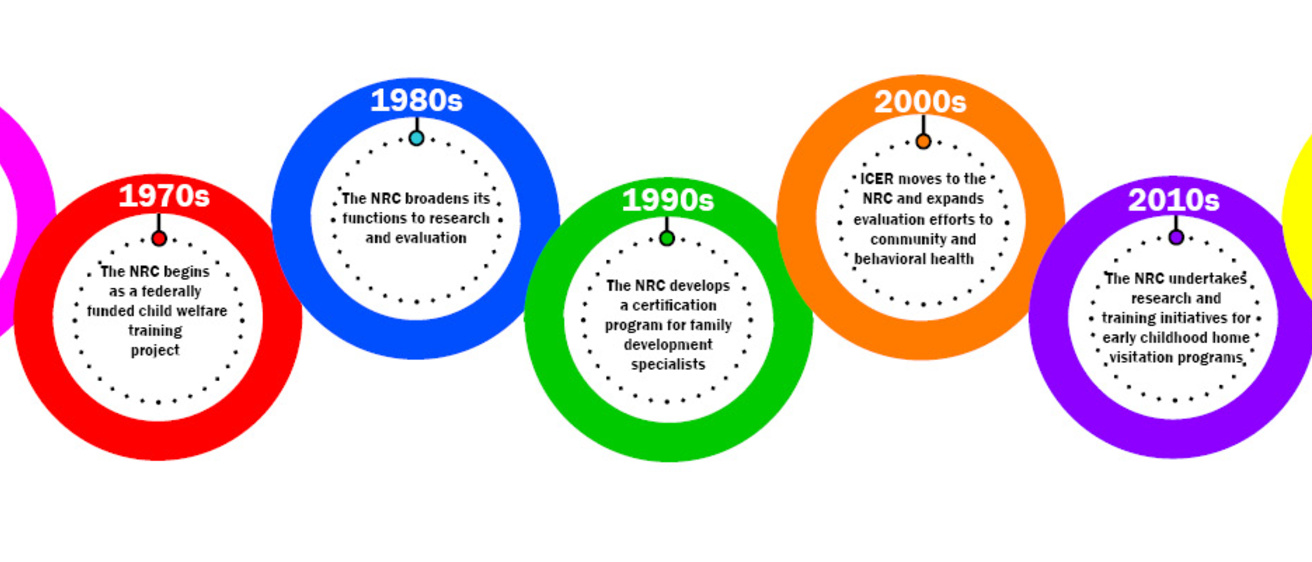The National Resource Center for Family Centered Practice (NRC) at the University of Iowa School of Social Work has been a leader in family centered research, training, and technical assistance for more than 35 years. The Center was an early pioneer in training for home-based, family centered child welfare services, later expanding its capacities to include research, evaluation, and technical assistance. The NRC now works in the areas of child welfare, family support, community and behavioral health and juvenile justice and has worked in all fifty states, several U.S. Protectorates, Europe, Asia, North, Central and South America, and Australia. The organization remains committed to a family-centered, culturally competent approach across the continuum of human services.
A timeline of the organization’s history includes notable work, grants, and organizational changes:
1978
The organization began as the National Clearinghouse on Home-Based Services under sponsorship by the Institute of Child Behavior and Development, the University of Iowa School of Social Work and Families Inc. of West Branch, Iowa.
Publication of Home-Based Services for Children and Families: Policy, Practice and Research (Maybanks & Bryce).
1979
The National Clearinghouse published its first Prevention Report, a biannual newsletter disseminated to researchers and practitioners across the country.
1981
The National Clearinghouse received a grant from the Children’s Bureau to conduct research, disseminate information and provide training and consultation on preventive services to states.
Publication of Treating Families in the Home: An Alternative to Placement (Bryce & Lloyd).
The National Clearinghouse became the National Resource Center on Family-Based Services (NRCFBS).
Mid-1980s
The NRC broadened its functions from training and technical assistance to research and evaluation with two federally funded research studies, “Factors Contributing to Success and Failure in 11 Family Based Service Programs in 6 States” and “A Study of Performance Contracting in Preventive Services to Families in Four States” as well as evaluations of state placement prevention programs.
1989
The NRC received funding from the Iowa Community Action Directors to develop a certification program for family development specialists.
1992
Publication of Alternative Models of Family Preservation: Family-Based Services in Context (Nelson & Landsman).
1994
As child welfare policy added family support to the exiting focus on family preservation, NRCFBS became the National Resource Center for Family-Centered Practice (NRCFCP), partnering with the National Indian Child Welfare Association and the Family Resource Coalition.
1996
Publication of federally funded research study on Length of Services & Cost-Effectiveness in Three Intensive Family Service Programs.
1998
The NRC published the “Automated Assessment of Family Progress”, a strengths-based outcome indicators and case management tool which contributed to the Family Development Matrix and Life Skills Progression.
2002
The Disproportionate Minority Contact (DMC) Resource Center began at the NRC to provide research, evaluation, and technical assistance on disproportionality in juvenile justice.
The NRC became a founding member of the World Association of Research and Development for Youth.
2003
The NRC received a five-year grant for Improving Recruitment and Retention in Public Child Welfare, developing a training program for public child welfare supervisors.
The NRC published the “Network Guide to Measuring Family Development Outcomes”, a synthesis of work to date on outcomes and case management approaches.
2005
The NRC received federal funding for "Improving Outcomes for Youth in Transition through Supervisor Training", further enhancing the Center’s supervisor training capacity and expanding work to youth aging out of foster care.
The NRC and University of Iowa School of Social Work founded the Latino Institute, a resource for culturally competent, strengths-based work with Latino families, and began hosting an annual Iowa Latino Conference.
2006
The Iowa Center for Evaluation Research (ICER) moved to the NRC from the University of Iowa College of Public Health and expanded its evaluation efforts to community and behavioral health topics.
2008
The NRC celebrated 30 years of family-centered practice with a conference held in Iowa City.
2009
The NRC, in partnership with the National Indian Child Welfare Association (NICWA) and ICF International, launched the National Resource Center for In-Home Services; NRCIHS was part of a national network of centers providing training and technical assistance to state child welfare agencies and tribes.
The NRC launched a certification training for family support supervisors.
2011
The NRC undertook research and training initiatives for early childhood home visitation programs, with findings used to understand and develop ongoing supervisor professional development for home visitors and to conduct workforce research.
2012
The NRC conducted research on an innovative supportive housing project which serves homeless families also involved in the child welfare system; the project is 1 of 5 housing-first initiatives across the country funded by the Children’s Bureau.
2015
The NRC training division received a grant to develop Family Peer Support and Peer Support Specialist trainings.
